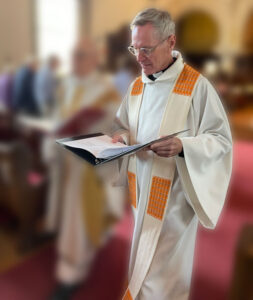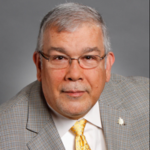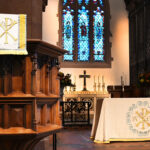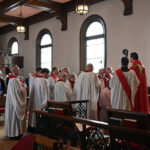This website uses cookies so that we can provide you with the best user experience possible. Cookie information is stored in your browser and performs functions such as recognising you when you return to our website and helping our team to understand which sections of the website you find most interesting and useful.
“I (pray) not only on behalf of (these my disciples) but also on behalf of those who believe in me through their word, that they may all be one. As you, Father, are in me and I am in you, may they also be in us, so that the world may believe that you have sent me.” — John 17:21
by Michael Redmond
In April, the Episcopal News Service reported that The Episcopal Church and the Church of Sweden (Lutheran) had formally established full communion, one with another, following some three decades of discussion. The agreement was signed March 27 in Paris during a Liturgy of Thanksgiving celebrated by Presiding Bishop Michael Curry, primate of The Episcopal Church, and Archbishop of Uppsala Martin Modéus, primate of the Church of Sweden.
“Every time two or more churches sign agreements or agree theologically, spiritually in any form, I think the angels in heaven rejoice and today we rejoice with them … and we have a lot to do in this world,” Modéus said, referring to the Gospel reading for that day, Matt. 9:35–38: “The harvest is plentiful but the laborers are few” (Episcopal News Service).
While the agreement added an international dimension to Episcopal – Lutheran relations, it follows up on the establishment of full communion between The Episcopal Church and the Evangelical Lutheran Church in America (ELCA) in 2001. Headquartered in Chicago, the ELCA is the largest Lutheran denomination in the United States, formed in 1988 by the merging of three Lutheran church bodies.
So what do we mean by full communion between churches? Let’s start by clarifying what full communion is not.
Full communion is not the merging of two institutions or jurisdictions into one denomination. It is not the erasure of any church’s identity, traditions, or culture. Full communion is like a marriage. The partners are equal, each bringing their own unique personhood into a relationship of mutual love and support. This relationship is something deeper than ecumenical cooperation in the service of common goals, admirable as these efforts are. Full communion between churches is the recognition and affirmation of a common life.
According to Called to Common Mission, a statement on full communion adopted by the Evangelical Lutheran Church in America and The Episcopal Church:
“We understand full communion to be a relation between distinct churches in which each recognizes the other as a catholic and apostolic church holding the essentials of the Christian faith. Within this new relation, churches become interdependent while remaining autonomous. Full communion includes the establishment locally and nationally of recognized organs of regular consultation and communication, including episcopal collegiality, to express and strengthen the fellowship and enable common witness, life, and service. Diversity is preserved, but this diversity is not static. Neither church seeks to remake the other in its own image, but each is open to the gifts of the other as it seeks to be faithful to Christ and his mission. They are together committed to a visible unity in the church’s mission to proclaim the Word and administer the Sacraments.”
What full communion means, practically, is fellowship in altar and pulpit. Each church may invite clergy of the other church to preach, teach, officiate the sacraments, and do pastoral and administrative work in the other. Each church recognizes the ordinations of the other’s clergy — with the proviso that the two churches work together to bring the ELCA’s episcopate into line with the historic succession model of The Episcopal Church. Also, full communion means, practically, that the lay people of each church are welcome to participate fully in the worship and sacramental life of the other church, as much as they may wish to. Clergy and laity may move freely between the two churches.
Within the Episcopal Church in Delaware, the sharing of clergy is already happening.
“We have several ELCA clergy serving in the diocese now,” said the Rev. Edward E. Godden, currently diocesan chaplain to retired clergy and their spouses. “I’m certainly no expert, but I’ve traveled further down this path than many, or most, Episcopal clergy, having served as interim pastor for an ELCA congregation in the Delaware-Maryland Synod for about 18 months.”
 Formerly rector of Immanuel Church, New Castle, and interim rector at three other parishes, Godden was invited by Lutheran friends to take the pulpit at Zion Lutheran Church, Wilmington, in 2013–2014. In 2018 Zion merged with Spirit of Life Lutheran. Today the congregation is known as Unity Church ELCA.
Formerly rector of Immanuel Church, New Castle, and interim rector at three other parishes, Godden was invited by Lutheran friends to take the pulpit at Zion Lutheran Church, Wilmington, in 2013–2014. In 2018 Zion merged with Spirit of Life Lutheran. Today the congregation is known as Unity Church ELCA.
“It began with the personal connection,” Godden recalled. “There are lots and lots of incredible blessings in this experience of ministry. It’s different enough from Episcopal service to be nourishing as well as challenging. The feeling is like traveling halfway across the country without somehow leaving home.”
The key, Godden said, is accepting that “they don’t adapt to you, you adapt to them. I assured them that I would be using your books, your vestments, your titles — so it was pastor instead of father. You’ve got two or three months to build credibility and trust. My experience was that we need each other in order to be each other. The distinctiveness of gifts in each tradition enriches the other. The Lutherans have a rich liturgical history and some stunning eucharistic prayers.”
Delaware is home to more than a dozen ELCA parishes, which are part of the ELCA’s Delaware-Maryland Synod, based in Baltimore, pastored by Bishop William J. Gohl, Jr.
The close relationship between America’s Anglicans and Lutherans — in particular, Swedish Lutherans — goes back a long way.
“It all started back in the 18th century, when Swedish congregations in America needed the services of Episcopal priests and Swedish priests helped out in Episcopal congregations,” said the Rev. Christopher Meakin, former ecumenical officer for the Church of Sweden, during the thanksgiving service in Paris (Episcopal News Service). “This shared service continued in various forms through the centuries and has also been expressed in ecumenical contexts where we’ve been able to do things together.”
There’s a lot of history in Delaware and the Philadelphia region, too. Following the establishment of the United States, several churches founded by Swedish Lutherans became Episcopal, including Trinity Old Swedes in Wilmington; Gloria Dei St. James and Christ Old Swedes in Philadelphia, and Trinity Old Swedes in Swedesboro, New Jersey. In July of 2024 Presiding Bishop Michael Curry will be visiting Wilmington to preside at a service celebrating the 325th anniversary of Trinity/Old Swedes’ consecration.
It’s also noteworthy that the English translation of Lutheranism’s seminal Augsburg Confession influenced the composition of the first of the Anglican articles of faith in the latter 1530s, culminating in the Thirty-Nine Articles of 1563.
The fostering of Christian unity has been a goal of the Anglican Communion and The Episcopal Church since the late 19th century, spurred by an essay by Episcopal priest William Reed Huntington (1838–1909), sixth rector of Grace Church, New York City.
NOTES
- The Evangelical Lutheran Church in America uses the word evangelical in the strict and classic sense that the Protestant Reformers used it, “of or according to the teaching of the gospel or the Christian religion, … of or denoting a tradition within Protestant Christianity emphasizing the authority of the Bible, personal conversion, and the doctrine of salvation by faith in the Atonement” (Oxford English Dictionary). Its use does not imply that the ELCA is affiliated with other churches or fellowships — frequently nondenominational communities — that also use the word evangelical.
- Also in full communion with The Episcopal Church are The Moravian Church (Northern and Southern Provinces); Mar Thoma Syrian Church of Malabar, India; Old Catholic Churches of the Union of Utrecht, and the Philippine Independent Church.
RESOURCES
ENS: Episcopal and Swedish churches sign full communion agreement https://www.episcopalnewsservice.org/2023/04/03/episcopal-and-swedish-churches-sign-full-communion-agreement/
CALLED TO COMMON MISSION: A Relationship of Full Communion between the Evangelical Lutheran Church in America and The Episcopal Church https://download.elca.org/ELCA%20Resource%20Repository/Called_To_Common_Mission.pdf
Principles of Christian Unity: The Chicago-Lambeth Quadrilateral 1886, 1888, The Book of Common Prayer, pp. 876-878

A versatile editor and writer with an extensive background in daily journalism, Michael Redmond, is a regular contributor to the Delaware Communion and a member of the diocesan communications team.
mr@michaelredmond.net





